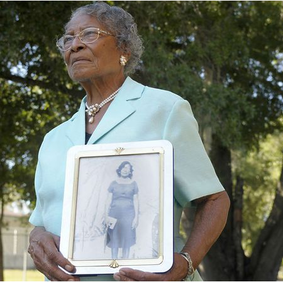Abandonment of Recy Taylor
Mackenzie Elle Knight
Mackenzie Elle Knight

“Walking home from a church revival in Abbeville, Alabama, when a green Chevrolet filled with white men pulled up. She tried to run, but one of the men grabbed the 24-year-old mother and forced her into the sedan. She was driven into a grove of pine trees, where, one by one, six men brutally raped her, threatening to cut her throat if she cried out. There were no arrests,” according to state records. After the rape, [she] was blindfolded and dropped along slide the dirty road. She was threatened to be killed if she told anyone. “At about 3 a.m., [her] father, who had been out searching for her, saw his daughter staggering along the highway. [A] friend, Fannie Daniel, who witnessed the abduction, had already reported the kidnapping to Will Cook, a former police chief who also owned a store. The assault [was reported] to the then-local county sheriff, Lewey Corbitt,” reports The Lily.
On September 3, 1994, Recy Taylor was sexually abused by a gang of white men, and although justice was not on her side, Rosa Parks was. “When the National Association for the Advancement of Colored People office in Montgomery found what had happened to Taylor in Abbeville, the NAACP sent Parks to investigate. She was 31. In Abbeville, Parks found Taylor at her home, a cabin on a sharecropper’s plantation. She took notes as Taylor described the assault,” The Lily publishes. As Parks was interviewing Recy a sheriff broke into the home and ordered Rosa to leave and if she did not he would arrest her.
Recy Taylor’s story became widely known after the headline, “Victim of White Alabama Rapists” was printed by The Chicago Defender. In the newspaper, it included a quote from the lawyer representing the suspects involved, “Nigger - ain’t $600 enough for raping your wife.” Recy Taylor’s husband refused to take the money, so Taylor brought the case to a grand jury. Rio Jackson believes, “It was right not to take the money, that does not in any way make-up for her rape. A part of her will never come back, and money can not fix that.” Kelsey Mitchell agrees, “Money will never account for what happened to her, it will not cure the aftermath of what [Recy] will endure after the fact.”
“On Oct. 9, 1944, a grand jury refused to indict the men. Infuriated, Rosa explained the urgency of writing protest letters to Alabama Governor, Chauncey Sparks. “Parks sent a letter of her own on Alabama Committee for Equal Justice letterhead to the governor: As a citizen of Alabama, I urge you to use your high office to reconvene the Henry County Grand Jury at the earliest possible moment,” Parks wrote. “Alabamians are depending upon you to see that all obstacles, which are preventing justice in this case, be removed. I know that you will not fail to let the people of Alabama know that there is equal justice for all of our citizens.”
“My interpretation of Rosa Parks’ letter is that justice is a privilege for all citizens, so it should not be hard to achieve in a case like this with multiple witnesses that can prove Recy Taylor’s case,” Tish Marshall perceives. “Justice should not fall short when it regards a Black woman,” Rio Jackson interprets.
Governor Sparks, in response, ordered another inquiry of the rape. On February 14, 1945, another grand jury in Henry County refused to charge the suspects. The men were never prosecuted. 66 years later in 2011, Alabama lawmakers issued an apology letter to Recy Taylor on the handling of her rape case, “That we acknowledge the lack of prosecution for crimes committed against Recy Taylor by the government of the State of Alabama. That we declare such failure to act was, and is, morally abhorrent and repugnant, and that we do hereby express profound regret for the role played by the government of the State of Alabama in failing to prosecute the crimes.” Mitchell, outraged at this statement, explains, “Is that it? An apology will not clear the torment and agony black people will face in Alabama when they know as soon as they step in court they are seen as the criminal, or in the wrong.” Marshall adds, “This letter will not bring hope to black people in Alabama or to Recy Taylor. Black people have been failed too many times in that state, so no, this so-called apology will not be accepted.”
The apology issued from lawmakers in Alabama is seen to some as just to clear their conscience. The letter is 66 years too late, Alabama has a history, to this day, of making black people seem as a perpetrator in every case they receive. So they should understand why most civilians will never forgive or forget the way Recy Taylor and other black women are treated when they express their experience and are shunned for doing so.
On September 3, 1994, Recy Taylor was sexually abused by a gang of white men, and although justice was not on her side, Rosa Parks was. “When the National Association for the Advancement of Colored People office in Montgomery found what had happened to Taylor in Abbeville, the NAACP sent Parks to investigate. She was 31. In Abbeville, Parks found Taylor at her home, a cabin on a sharecropper’s plantation. She took notes as Taylor described the assault,” The Lily publishes. As Parks was interviewing Recy a sheriff broke into the home and ordered Rosa to leave and if she did not he would arrest her.
Recy Taylor’s story became widely known after the headline, “Victim of White Alabama Rapists” was printed by The Chicago Defender. In the newspaper, it included a quote from the lawyer representing the suspects involved, “Nigger - ain’t $600 enough for raping your wife.” Recy Taylor’s husband refused to take the money, so Taylor brought the case to a grand jury. Rio Jackson believes, “It was right not to take the money, that does not in any way make-up for her rape. A part of her will never come back, and money can not fix that.” Kelsey Mitchell agrees, “Money will never account for what happened to her, it will not cure the aftermath of what [Recy] will endure after the fact.”
“On Oct. 9, 1944, a grand jury refused to indict the men. Infuriated, Rosa explained the urgency of writing protest letters to Alabama Governor, Chauncey Sparks. “Parks sent a letter of her own on Alabama Committee for Equal Justice letterhead to the governor: As a citizen of Alabama, I urge you to use your high office to reconvene the Henry County Grand Jury at the earliest possible moment,” Parks wrote. “Alabamians are depending upon you to see that all obstacles, which are preventing justice in this case, be removed. I know that you will not fail to let the people of Alabama know that there is equal justice for all of our citizens.”
“My interpretation of Rosa Parks’ letter is that justice is a privilege for all citizens, so it should not be hard to achieve in a case like this with multiple witnesses that can prove Recy Taylor’s case,” Tish Marshall perceives. “Justice should not fall short when it regards a Black woman,” Rio Jackson interprets.
Governor Sparks, in response, ordered another inquiry of the rape. On February 14, 1945, another grand jury in Henry County refused to charge the suspects. The men were never prosecuted. 66 years later in 2011, Alabama lawmakers issued an apology letter to Recy Taylor on the handling of her rape case, “That we acknowledge the lack of prosecution for crimes committed against Recy Taylor by the government of the State of Alabama. That we declare such failure to act was, and is, morally abhorrent and repugnant, and that we do hereby express profound regret for the role played by the government of the State of Alabama in failing to prosecute the crimes.” Mitchell, outraged at this statement, explains, “Is that it? An apology will not clear the torment and agony black people will face in Alabama when they know as soon as they step in court they are seen as the criminal, or in the wrong.” Marshall adds, “This letter will not bring hope to black people in Alabama or to Recy Taylor. Black people have been failed too many times in that state, so no, this so-called apology will not be accepted.”
The apology issued from lawmakers in Alabama is seen to some as just to clear their conscience. The letter is 66 years too late, Alabama has a history, to this day, of making black people seem as a perpetrator in every case they receive. So they should understand why most civilians will never forgive or forget the way Recy Taylor and other black women are treated when they express their experience and are shunned for doing so.

